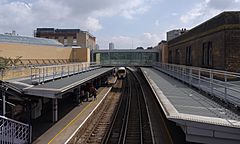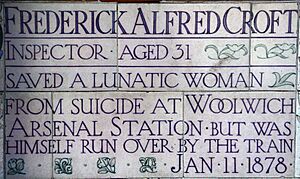Woolwich Arsenal station facts for kids
 |
|
| Location | Woolwich |
|---|---|
| Local authority | Royal Borough of Greenwich |
| Managed by | Southeastern |
| Station code | WWA |
| DfT category | C2 |
| Number of platforms | 4 (2 underground platforms served by DLR) |
| Accessible | Yes |
| Fare zone | 4 |
| OSI | Woolwich |
| Key dates | |
| 1 November 1849 | Opened |
| 12 January 2009 | DLR opened |
| Other information | |
| Lists of stations | |
| Other websites |
|
Woolwich Arsenal station is a busy train station in the middle of Woolwich, a town in the Royal Borough of Greenwich. It's special because you can catch two different types of trains here: Docklands Light Railway (DLR) and National Rail services.
The station has two main parts. The part for National Rail trains is built above ground. It serves trains on the North Kent Line and the Dartford Loop Line. These trains travel between London and Dartford. The company Southeastern runs these services. Some trains even go further, to places like the Medway Towns, or all the way to Luton via the City of London.
The other part of the station is for the DLR. This is where the DLR line ends. Transport for London runs the DLR services.
The older part of the station has a modern look. It's found near General Gordon Square, which is a nice green park. The newer part of the station leads to the underground DLR trains. It faces Powis Street, a long street with many shops. The station is named after the famous Royal Arsenal area nearby. It's the furthest DLR station you can reach, located in Travelcard Zone 4.
On the main train network, Woolwich Arsenal station is about 15 kilometers (9 miles and 32 chains) away from London Charing Cross.
Contents
A Look Back in Time
The station first opened its doors in 1849. It served the North Kent Line, connecting London to Gillingham. The station building was rebuilt in 1906. It used a common type of brick found in southeast London.
Later, in 1992–93, the station was rebuilt again. This time, it got a very modern design with steel and glass. It has a bright, airy feel with a curved shape, which was very different from its older look.
In 1973, there were plans to build a new underground train line called the "Fleet line." It would have gone from Charing Cross to Woolwich Arsenal and even further. However, these plans were put aside because of money problems. Instead, a different route became part of the Jubilee line.
Woolwich Arsenal station got bigger in 2009. Transport for London finished extending the Docklands Light Railway (DLR) from King George V to Woolwich Arsenal. This new part officially opened on January 12, 2009.
In 2014, some people asked the Mayor of London to change the station's fare zone from Zone 4 to Zone 3. But the Mayor said no. He explained that it would cost over a million pounds each year.
How the Station is Designed

The National Rail part of the station has two platforms above ground. One platform is for trains going towards London. It even has a place where you can buy refreshments! The other platform is for trains heading east, towards places like Plumstead and Abbey Wood.
The DLR part of the station is underground. It has two platforms that are next to each other, forming an "island." Since Woolwich Arsenal is the last stop for the DLR, both platforms serve trains going towards Bank or Stratford International. These trains pass through London City Airport and Canning Town. The trains leave in an easterly direction because of how the tracks are built under the River Thames.
Getting Around: Connections
Many London Buses routes stop at Woolwich Arsenal station, making it easy to connect to other parts of London.
The New Elizabeth Line Station
In May 2022, a new Elizabeth line station opened in north-east Woolwich. This happened after many people asked for it, especially because new homes were being built in the area. The new Elizabeth line station is about 200 meters north of Woolwich Arsenal station. It's on the north side of the A206 road.
Train Services
National Rail Trains
National Rail services at Woolwich Arsenal are run by Southeastern and Thameslink. They use modern electric trains.
Here's how often trains usually run during off-peak times (when it's not rush hour):
- 4 trains per hour (tph) go to London Cannon Street. Two of these go via Greenwich, and two go via Lewisham.
- 2 tph go to Luton via Greenwich.
- 2 tph go to Barnehurst, then return to London Cannon Street.
- 2 tph go to Dartford.
- 2 tph go to Rainham via Chatham.
During busy peak hours, even more trains stop at the station. This includes trains to and from London Cannon Street via Sidcup.
DLR Trains
Here's how often DLR trains usually run from Woolwich Arsenal during off-peak times:
- 6 tph go to Stratford International.
- 6 tph go to Bank.
During peak hours, the DLR runs more often, with up to 16 trains per hour to and from the station. This means up to 8 trains per hour to Bank and Stratford International.
| Preceding station | Following station | |||
|---|---|---|---|---|
|
Charlton
|
Thameslink
North Kent Line
|
Plumstead
|
||
|
Woolwich Dockyard
|
Southeastern
North Kent Line
|
|||
| King George V towards Bank or Stratford International
|
Docklands Light Railway | Terminus | ||
| Abandoned Plans | ||||
| Preceding station | Following station | |||
| Silvertown towards Stanmore
|
Jubilee line Phase 3 (1980)
Never constructed |
Terminus | ||
 | May Edward Chinn |
 | Rebecca Cole |
 | Alexa Canady |
 | Dorothy Lavinia Brown |


